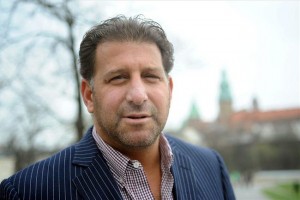A few years ago, on a rare early night off at the U.S. Open and with my son in town, we cabbed down to Les Halles, a country French restaurant on Park Avenue, where in the middle of a pretty good dinner Kenny Meyerson stepped over to our table and began ripping off his usual series of one-liners.

As always, I found myself laughing at just about everything Kenny said, while my son sat there staring silently at the performance, not quite believing what he was hearing. Afterward, in a semi-whisper, he asked: “Dad, who the hell was that?”
That, I told him, is the best agent in professional tennis.
The news hit me this morning with a jolt. Kenny, only 48 years old, had died overnight in his sleep. I sat there staring at the computer screen, delivering those sighs you heave when something unexpected and bad happens to someone you know and, more importantly, someone you really liked a great deal.
Ken Meyerson was not only the best agent in tennis, he was the best agent period that I’ve known in the 45 years I’ve been a reporter or columnist, and I mean the best in any sport. He was unwaveringly honest and loyal. He really would give you the shirt off his back, provided he was wearing an undershirt.
Andy Roddick has had some coaching changes in his long career, but he’s never changed agents because Kenny wasn’t just good for him professionally, but good for him personally. They were as close to being brothers as you can get without being actually related.
When you first met Kenny you weren’t quite sure what to make of him. He was one part Henny Youngman, one part Rodney Dangerfield and one very big part super-agent. He knew what he was talking about and he didn’t make promises he couldn’t keep. When Roddick turned professional, he had so much talent and upside that he could have signed with anyone, including the mega-agency IMG. He signed with Meyerson, who was a rising star at SFX.
Kenny could be deadly serious, but it was a seriousness that was often punctuated with soft ribbing (“you’re going to wear those shorts to Roddick’s match?”) and conversations with him could end abruptly (“OK, I gotta go. We’ll finish this later.”).
He was a great agent because he not only got close enough to his clients to know what ice cream flavor that favored, and Ken’s was pistachio, by the way, but he understood how to deal with the media.
If you criticized one of his clients in print and you could back it up with the facts, you’d never have Meyerson leaning on you or subtly suggesting you might not get the next interview you want. He gave you his mobile number and his email and one way or the other you’d get him if you needed him and he’d give you the information you sought.
Sometimes the information was “not for attribution,” but he would never lie to you, which is something you can’t say about many agents. If he didn’t want to tell you something, he’d tell you, “I’m not going to talk about that.” But he would never B.S. you.
Greg Sharko, who works media relations for the ATP tour, remembers being invited to dinner one night by Meyerson at the Aussie Open, a small gathering of Shark, Kenny, Fernando Gonzalez and Gonzo’s then-coach, Larry Stefanki (who now coaches Roddick).
“Ken called Gonzo’s dad in the middle of dinner, whatever time it was in Chile, and was so pumped and proud of Gonzo reaching his first Grand Slam final,” Sharko recalled.
That was pure Meyerson. He wasn’t just your agent, he was your friend and your parents’ friend. He was family.
I’m going to heave another sigh, I think, and call it a night. Tennis has lost one hell of a good guy and I’m going to miss him a lot.
